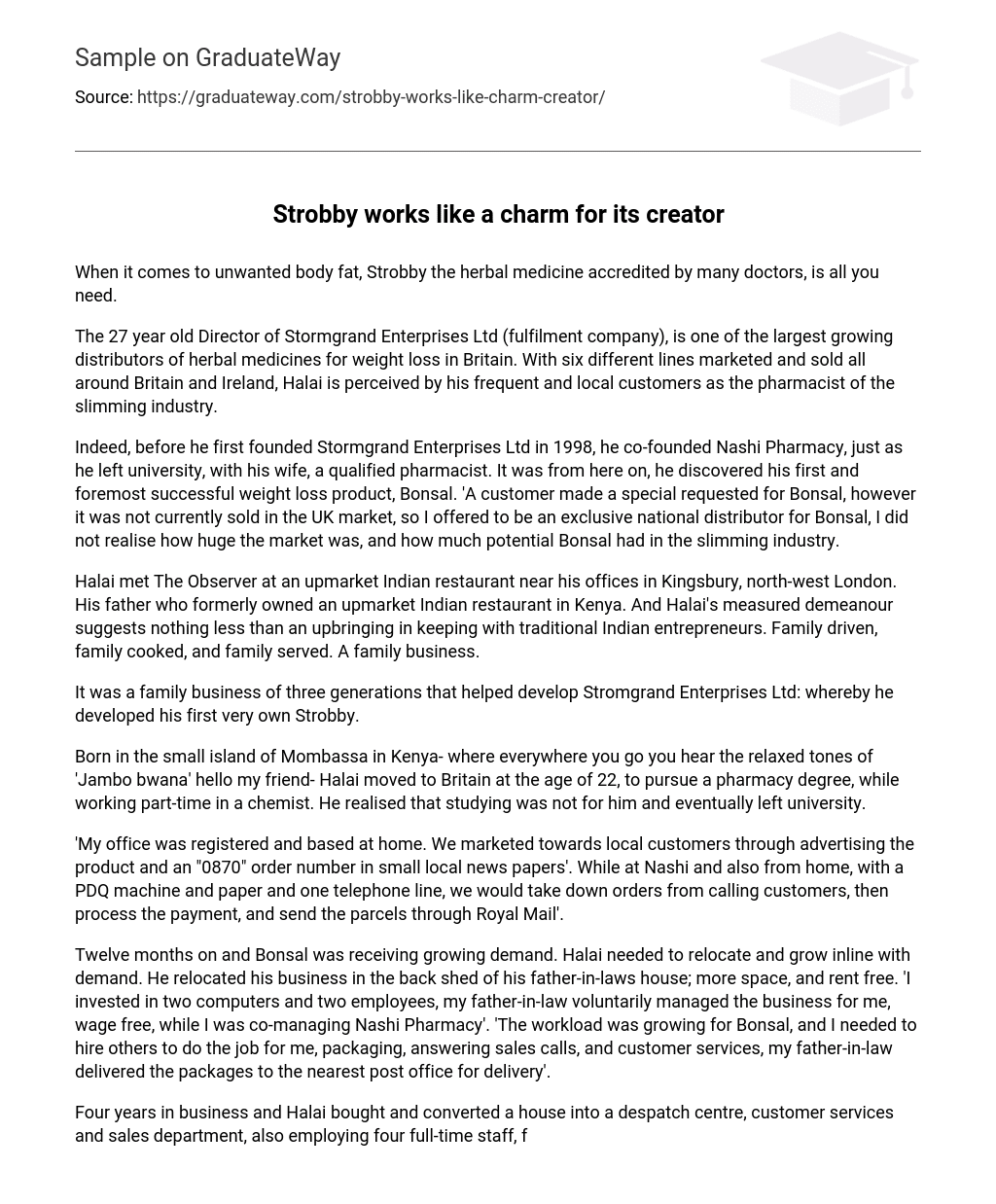When it comes to unwanted body fat, Strobby the herbal medicine accredited by many doctors, is all you need.
The 27 year old Director of Stormgrand Enterprises Ltd (fulfilment company), is one of the largest growing distributors of herbal medicines for weight loss in Britain. With six different lines marketed and sold all around Britain and Ireland, Halai is perceived by his frequent and local customers as the pharmacist of the slimming industry.
Indeed, before he first founded Stormgrand Enterprises Ltd in 1998, he co-founded Nashi Pharmacy, just as he left university, with his wife, a qualified pharmacist. It was from here on, he discovered his first and foremost successful weight loss product, Bonsal. ‘A customer made a special requested for Bonsal, however it was not currently sold in the UK market, so I offered to be an exclusive national distributor for Bonsal, I did not realise how huge the market was, and how much potential Bonsal had in the slimming industry.
Halai met The Observer at an upmarket Indian restaurant near his offices in Kingsbury, north-west London. His father who formerly owned an upmarket Indian restaurant in Kenya. And Halai’s measured demeanour suggests nothing less than an upbringing in keeping with traditional Indian entrepreneurs. Family driven, family cooked, and family served. A family business.
It was a family business of three generations that helped develop Stromgrand Enterprises Ltd: whereby he developed his first very own Strobby.
Born in the small island of Mombassa in Kenya- where everywhere you go you hear the relaxed tones of ‘Jambo bwana’ hello my friend- Halai moved to Britain at the age of 22, to pursue a pharmacy degree, while working part-time in a chemist. He realised that studying was not for him and eventually left university.
‘My office was registered and based at home. We marketed towards local customers through advertising the product and an “0870” order number in small local news papers’. While at Nashi and also from home, with a PDQ machine and paper and one telephone line, we would take down orders from calling customers, then process the payment, and send the parcels through Royal Mail’.
Twelve months on and Bonsal was receiving growing demand. Halai needed to relocate and grow inline with demand. He relocated his business in the back shed of his father-in-laws house; more space, and rent free. ‘I invested in two computers and two employees, my father-in-law voluntarily managed the business for me, wage free, while I was co-managing Nashi Pharmacy’. ‘The workload was growing for Bonsal, and I needed to hire others to do the job for me, packaging, answering sales calls, and customer services, my father-in-law delivered the packages to the nearest post office for delivery’.
Four years in business and Halai bought and converted a house into a despatch centre, customer services and sales department, also employing four full-time staff, four part-time staffs and a full-time supervisor. Halai understood the importance of up-to-date technology and invested in technology and software, advanced telephones and technological system for call centres, and a company van to deliver parcels to the post office.
However, Halai began to face obstacles, ‘new entrants to the market were growing. ‘There are little legal requirements for retailing herbal product’. According to the Trading Standards Authority (TSA), MCA (Medical Controls Agency) and alike, herbal products are categorised as food. Thus, other than the norm requirements of setting up a business, the additional requirement is a license to sell food products, it is easy, any fruit and vegetable shop, corner shop etc could do it’.
Halai had accumulated financial power, and the financial backing and willingness from the manufacturers of Bonsal for more lucrative investment in marketing. Halai launched an advertisement in national newspapers, The Mirror and The Sun. ‘Competition was looking fierce, competitors were entering and dropping out the market, we launched a new product, named Calix, a vegetarian alternative to Bonsal, which did not contain fish extracts such as Chitosan’.
The requirements for cutting costs was becoming inevitable, only to increase profits for re-investment. Halai took his business to a more advanced level; he sub-contracted his customer services and telesales operation in India, only requiring a manager, an administrator and a packer in his office. Halai then rented out one half of the building to another company, to create further revenue.
She says: “Successful people are the ones who don’t switch off from their business. They are the ones who are continually thinking of new ways to move their company forward.”





